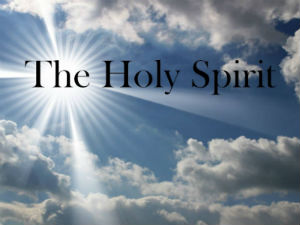
By Neil Earle

No subject is more uplifting, reassuring and strengthening than the subject of the Holy Spirit. It’s truly worth the price of admission. “Uphold me with your generous, princely, royal, magnanimous spirit (all words can apply)” was the repentant King David’s prayer in the crux moment of his life (Psalm 51:12). “May your good spirit guide me on level ground,” the psalmist begged in Psalm 143: 10 (NAB).
Many Christians associate this divine agent with the New Testament Church beginning on the Day of Pentecost in the 30s AD. However, the doctrine really begins in the Old Testament which is both interesting and inspiring to search through.
Actually, the theme begins as quickly as Genesis 1:1-2, when the Spirit of God moved or “hovered” or “brooded” on the face of the waters, according to many new translations. Other creation texts confirm this intimate personal activity of God and His Spirit, such as Psalm 33:6: “By the word of the Lord the heavens were made, their starry host by the breath of his mouth.”
There, say some theologians are the “two arms” of God the Father, to get really down to earth for a second – the Word and the Spirit. Word and Spirit joined to the Father God are known to Christians as the Holy Trinity. Genesis 1 shows that God speaks his word and the Spirit does the shaping.
This may be pushing things too far, caution other Bible students, but the subtle nuance of a threefold activity in creation is indicated by the fact that “breath” and “spirit” are the same word in the Hebrew, ruah, which, interestingly, is in the feminine gender.
There are certainly more enthralling suggestions like these scattered across the Old Testament, but let us study a little bit more systematically this most important teaching.
As we covered already, Old Testament writers knew the Holy Spirit from Genesis 1:1-2 and repeatedly sang of it as the closely associated Agent and Partner in creation, as Psalm 104:30 reiterate, “When you send forth your Spirit they are created.” One intriguing fact here as we move on is that all the attributes theologians associate with God the father – “the omnis,” omniscience, omnipresence – are also attributed in abundance to the Holy Spirit.

In addition to all this, the Spirit is described as being able to be grieved in Isaiah 63:10, “resting” in Zechariah 6:8, and personally transformative in 1 Samuel 10:6. As wonderful as all this is, much much more is to come in the New Testament.
But that’s another sermon, for another time. Right now let’s be busy asking God for more of his spirit of power, for ourselves and others.